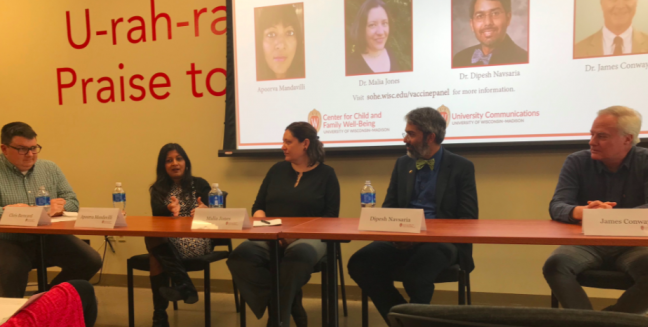The Center for Child and Family Well-Being and University Communications hosted a panel on vaccination which discussed how physicians, scientists and journalists can “promote public health” Tuesday evening at Union South.
Vaccine hesitancy and refusal have been around since the development of the very first vaccine, panelist James Conway, professor of pediatrics at the University of Wisconsin and associate director for health sciences at the UW Global Health Institute said. But a large part of the recent resurgence of vaccine hesitancy can be attributed, at least partly, to how well vaccines have worked, Conway said.
“I believe we’ve, in many ways, become a victim of our own success with our initial penetration with vaccines into large portions of the population,” Conway said. “When you get to certain levels of herd immunity, you really do start to diminish the disease enough that people just stop fearing these diseases.”
Madison-based company will test ‘revolutionary’ universal flu vaccine this spring
Additionally, the two largest groups at risk of being vaccine-hesitant were isolated fundamentalist religious groups and monetarily well-off white parents who prefer “a natural style of parenting,” Malia Jones, a public health researcher and social epidemiologist at UW’s Applied Population Lab, said.
The incidence of vaccine-hesitancy is increased in these communities in part because of their likelihood to communicate with and get information from each other, Jones said. Outbreaks occur when fewer than 80 percent of a population is vaccinated against a disease, and because of the vaccine-hesitancy within these communities is high, often they have an increased chance of outbreaks, Conway said.
“Essentially, you’ve got a can of gasoline waiting for someone to drop a match in it,” Conway said.
Flu season reaches peak later than usual, number of patients drops nationally
UW’s spring 2019 Science Writer in Residence Apoorva Mandavilli said these groups are especially at risk because fear of “the establishment” — government and big pharmaceutical companies — trying to harm their children is prevalent. Dipesh Navsaria, an associate professor of pediatrics at UW, said a way to combat this is to validate the parent’s concern, then present them with scientifically sound facts that refute the information the parent may have heard anywhere.
Refusal or hesitancy to vaccinate may not follow a “rational action model,” Jones said. One example of this is the supposed link between autism and vaccination, Mandavilli said.
“These parents are linking vaccinations to autism because both things happen at the same time,” Mandavilli said. “The symptoms of autism become really obvious around the same time these kids are getting their vaccines, so they put two and two together and come up with 50 and say this is what caused my child to regress … you could have any number of studies [refuting the link] — there have been dozens now — and it doesn’t really matter. These people are not going to change their mind. It comes from a deep, sort of emotional belief and a need for an answer for why this happened to their child.”
UW Arboretum recognized for historical contributions to land restoration movement
When writing about vaccines and immunization, journalists often avoid using numbers and statistics regarding death rates of vaccine-preventable diseases within the U.S., Mandavilli said. This perpetuates the line of thinking that sees the supposed possible side effects of vaccination as more worrying than the possibility of getting a vaccine-preventable disease, Mandavilli said.
Navsaria said because of this, it is important to remind parents that doctors and pharmaceutical companies are on their side, and they are all working toward the same goal — keeping their child safe.
“[It is important for journalists to] simplify the scientific concepts that can be complex, to really lay out why these things matter,” Navsaria said. “Something that works for me, and something I think could work in writing is I sometimes look at parents and say ‘Please remember, we have the same goal. To keep your child safe from harm, we’re really on the same side here,’ because it’s easy to feel like it’s an us versus them thing.”



















